Have you ever gone for a ride just to find you have a dry chain and no chain lube at home? It’s an awful feeling, so I don’t blame you for starting looking for an alternative. However, Vaseline or WD-40 may not be the best choice.
Vaseline can be used as a chain lube alternative as it will lube the chain. However, due to the thickness, it will not optimally lube the chain, which means certain parts will not be lubed. Therefore, use it as a last resort, as it also attracts too much dirt, destroying the chain in the long run.
WD-40 is a poor alternative for chain lube as it serves the opposite purpose. Instead of lubricating the chain, it dries it out. As a result, the chain rubs against the sprockets and destroys them. Also, a dry chain can start to rust if it isn’t properly lubed after using WD-40.
Chain lube will always be the best choice for chain lubrication, but if you’ve just run out and still want to go for a ride, a few alternatives can help you in the short term.
What makes a good chain lubricant?
There are certain properties that make something a good lube. The bike-specific lube meets all these characteristics, while others tick the boxes at only a few. The closer it is to bike-specific lube, the better.
A good chain lube must be:
- Actually lubricating the chain. That is the point of it all. If the chain is not lubricated after application, there is no point in applying anything at all.
- Viscous enough. It must reach all parts of the chain and lubricate all joints where metal-to-metal friction could occur.
- Water resistant. It must not be washed off by the small splash of water that occurs when driving on wet roads.
- Not too greasy. It must not collect too much dirt, which is picked up from the road by the tire. Bits of dirt can destroy the chain and sprockets.
- Easy to remove. The lube should be easy to remove from the chain, allowing it to be cleaned and re-lubricated regularly.
If you find an alternative to chain lube that ticks all the boxes, you can use it to lube your chain without any problems. But the fact is that companies invest millions to develop the best chain lube, so it’s hard to find a better option than what’s already on the market.
Can I use Vaseline as chain lube?
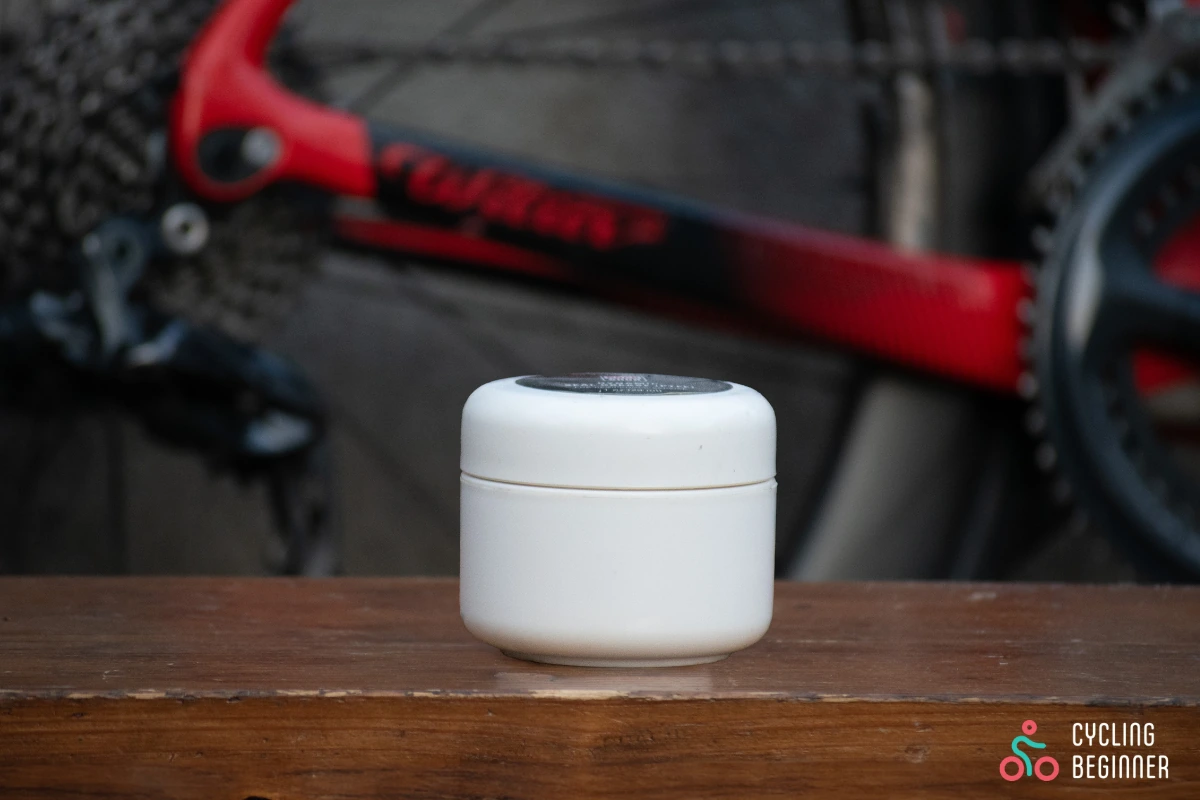
✅ Lubing the chain
❌ Viscous enough
✅ Water resistant
❌ Not too greasy
❌ Easy to remove
Vaseline is one of the most commonly used substitutes for chain lube, but that doesn’t make it a great choice. In fact, it’s not good at all.
The problem with Vaseline is that it is too thick and greasy. Yes, it lubricates the chain, but only the top layer, while the inside of the chain, where friction also occurs, remains dry. This leads to faster chain deterioration.
The fact that Vaseline is greasy also means that it attracts many bits of dirt, further accelerating the chain’s deterioration. It won’t be destroyed after one ride, but it will have a reduced use-life in the long run.
Last but not least, while Vaseline is water-resistant, this also means that it is difficult to remove. Because of the build-up of dirt, it would make sense to clean it after each ride, but it’s time-consuming, so many people prefer not to do it. This means that the chain continues to deteriorate.
Verdict
Vaseline is an emergency solution to be used only if you have a completely dry chain and no other lubricant is available. After the ride, I suggest you clean the chain (and the bike) immediately and apply a bike-specific chain lube.
Can I use WD-40 as a chain lube?
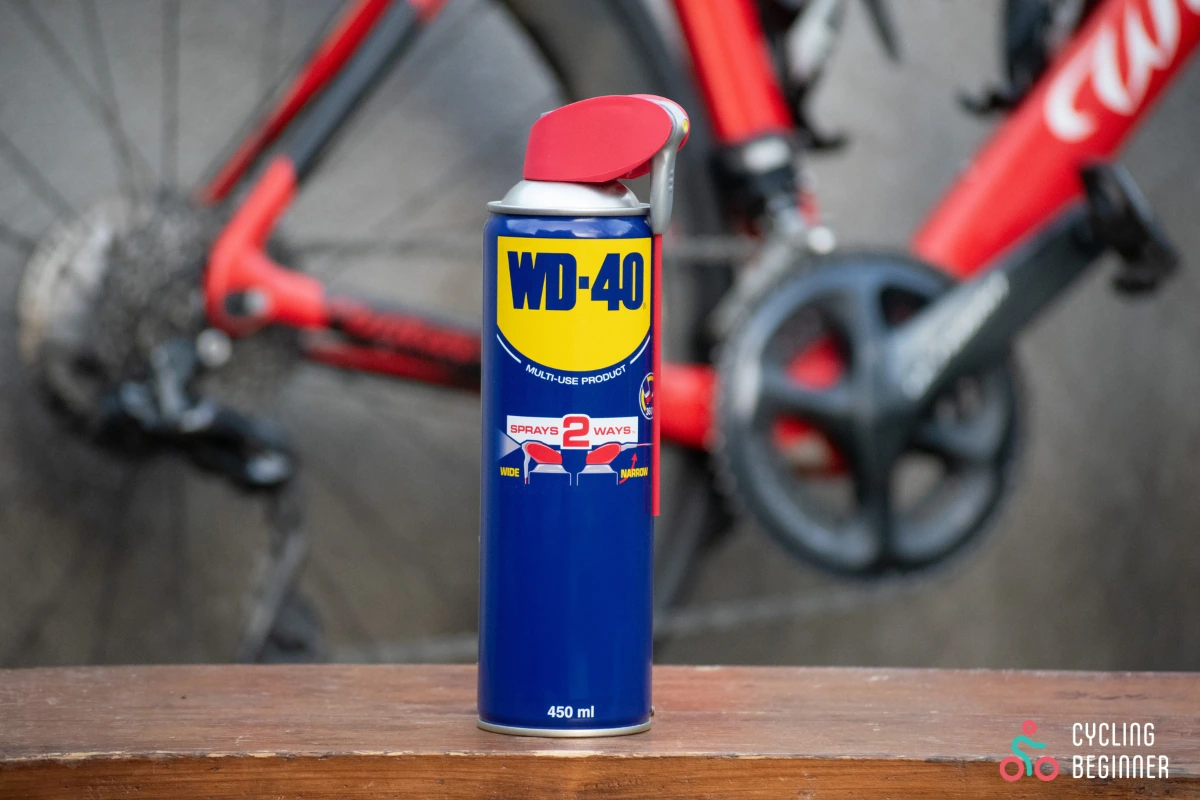
❌ Lubing the chain
✅ Viscous enough
❌ Water resistant
✅ Not too greasy
✅ Easy to remove
Many cyclists think of WD-40 when looking for chain lube alternatives. If it ‘lubes’ a squeaky door and gets the screws turning again, it must be good for the chain too, right? Wrong!
WD-40 is one of the worst things you can put on your chain. It actually removes what little lube is left on the chain and dries it out. After applying WD-40, the chain is therefore less lubricated than before the application.
Even if WD-40 would tick all the other boxes, the ‘lube’ that doesn’t lubricate is not recommended. So it doesn’t matter if it’s viscous or easy to remove — it’s not a lube!
Another thing against using WD-40 is that it makes the chain more susceptible to rusting by drying it out. And a rusty chain requires a quick replacement, so using WD-40 can cause unnecessary extra costs.
Verdict
WD-40 is a no-go. It will ruin the chain by drying it out, making it more susceptible to rusting, and most importantly, the chain will still not be lubricated.
Can I use chainsaw oil as a chain lube?
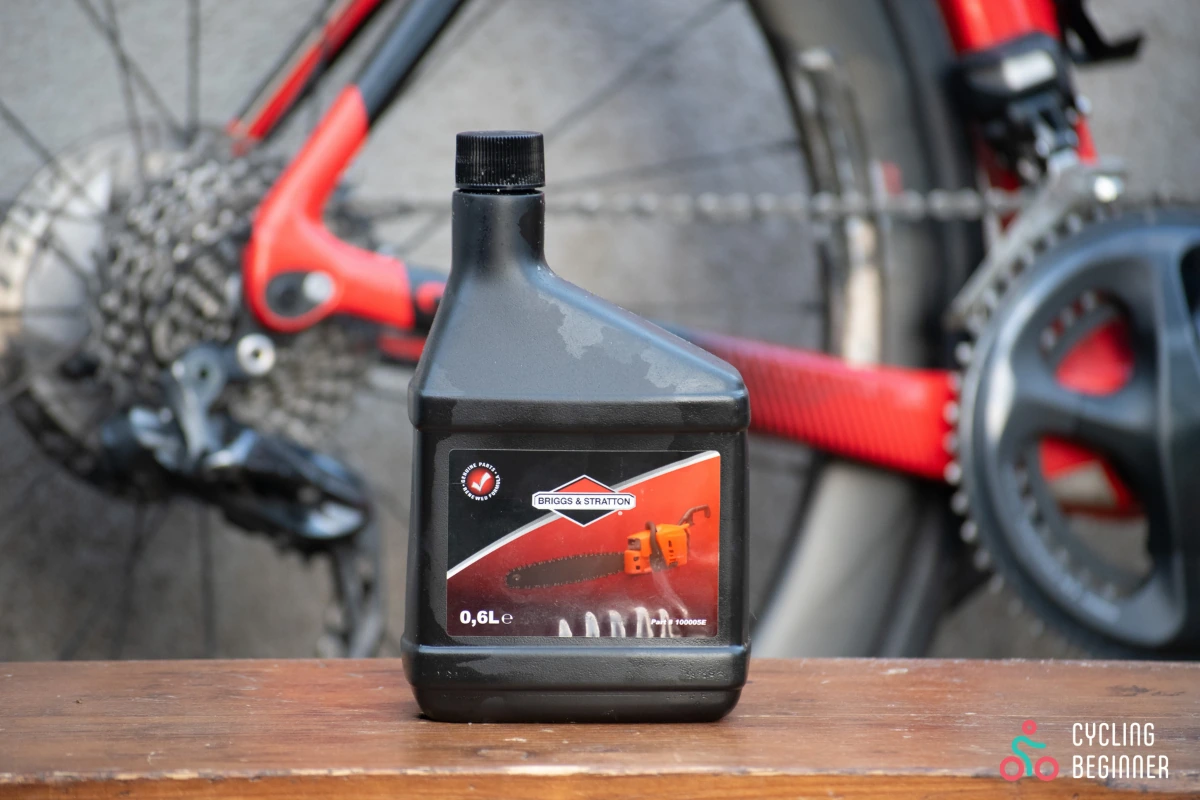
✅ Lubing the chain
✅ Viscous enough
✅ Water resistant
❌ Not too greasy
✅ Easy to remove
Chainsaw oil is probably the best alternative to chain lube. A chainsaw chain works in a similar way to a bike chain, so the lube should have a similar effect.
It will reach all the important parts of the chain and lubricant them properly. It’s also water resistant, so it should stay on the chain even after a ride in wet conditions.
Since it’s an oil, it’s quite greasy, so certain dirt parts will stick to the chain. However, that’s also true for wet chain lubes, so chainsaw oil is not that much worse in that regard.
Lastly, and that’s a big one for me, chainsaw oil can be removed quite easily. A standard degreaser you usually use on a chain should work just fine. That makes it a great emergency alternative, as you know you won’t spend hours cleaning the chain after the ride.
Verdict
If you have chainsaw oil at home, use it on a bike chain when you can’t use chain lube. It’s by far the best alternative to bike-specific lube, as it’s designed to lube the chain. Sure, it’s a bit different chain, but a chain nonetheless.
Can I use cooking/olive oil as a chain lube?
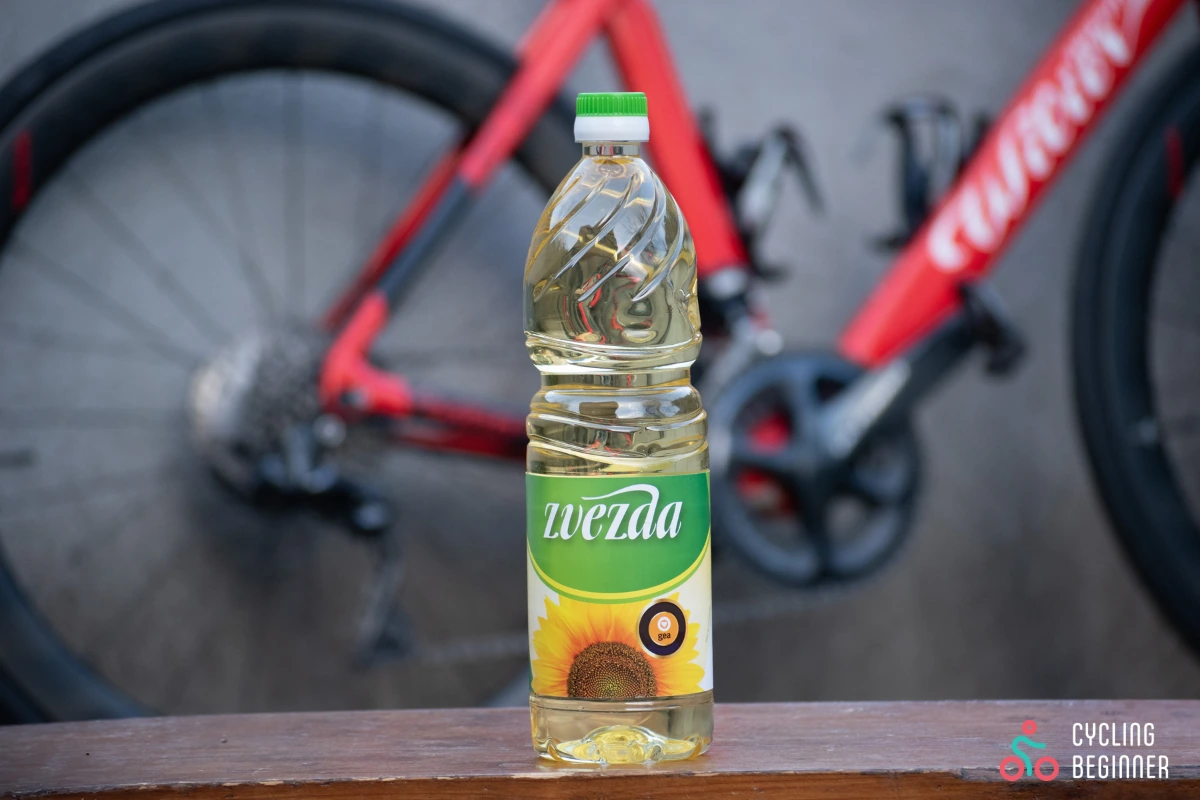
✅ Lubing the chain
✅ Viscous enough
✅ Water resistant
❌ Not too greasy
❌ Easy to remove
Cooking oil or olive oil performs pretty much the same. Both will lube the chain and are viscous enough to reach all the hidden parts of the chain.
But perhaps the viscosity is the main problem of cooking oil, as it’s too viscous. It’s so thin that most of it falls from the chain, so you need to use a lot of it to lube the chain sufficiently.
Another disadvantage is that it is quite greasy and attracts dirt particles that deteriorate the chain. Consequently, you’ll need to clean the chain regularly — ideally after every ride — but that’s a time-consuming process, as oil is hard to get off. A degreaser is your best chance, but be prepared to clean it a few times to get it all off.
Verdict
Cooking or olive oil is an okay solution to lube the chain, but don’t use it as a cheaper replacement for chain lube. It will lube the chain, but worse than you might expect. Additionally, you’ll spend quite some time cleaning the chain otherwise it will deteriorate quickly.
Can I use grease as a chain lube?
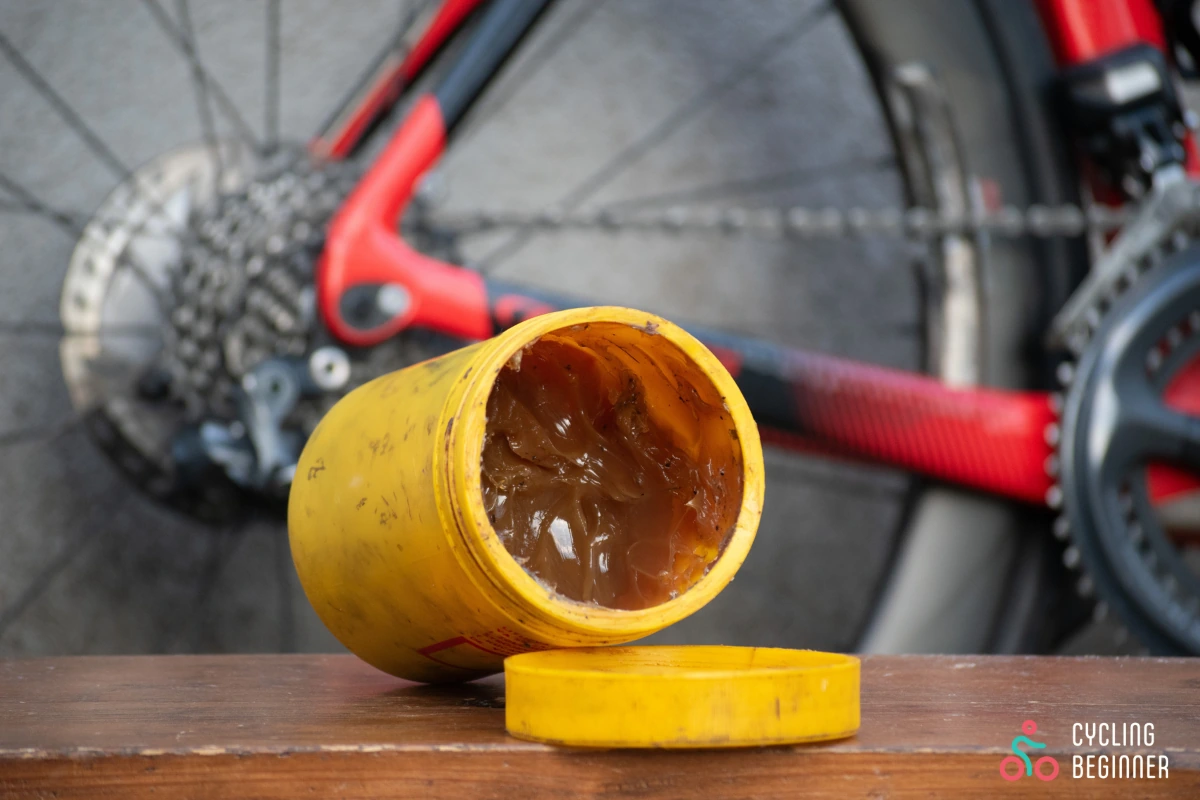
✅ Lubing the chain
❌ Viscous enough
✅ Water resistant
❌ Not too greasy
❌ Easy to remove
By lubricating the chain, you are in fact greasing it. So grease should be a good alternative. Unfortunately, it is not!
The main problem with grease is it’s too thick. It will only lubricate the top of the chain, not the small hidden areas. It’s also hard to apply it properly on the chain without greasing all the other bike parts.
Thickness also affects the attraction of dirt, which the grease attracts the most. As mentioned many times before, this deteriorates the chain.
Perhaps the biggest problem with grease is that it is impossible to remove from the chain. In most cases, you will have to remove the chain from the bike, clean it separately and fit it back on. And no cyclist has that kind of time after each ride.
Verdict
No, just no! Avoid grease at all costs. You’d better skip the ride and go to the shop to buy chain lube. You will thank yourself immeasurably on each subsequent ride.
My recommendation
Figuring out before a ride you ran out of chain lube sucks. Some cyclists will accept the fate and cancel the ride until they get a proper lube. I admire those who don’t and try to find a way to lube a chain with an alternative lube.
To those who are searching for the best alternative, I recommend the use of chainsaw oil. It’s the closest thing to the chain lube you’ll find in a household and actually works quite well.
If you don’t own the chainsaw and the chainsaw oil, the next best thing is cooking oil. However, due to its viscosity, it can hardly be expected to stay on the chain for long, so taking shorter rides and lubricating the chain as soon as possible with the bike-specific lubricant is recommended.
At the end of the day, these are all alternatives and shouldn’t be used regularly. Bike-specific lube is made for a reason, so use it whenever possible.
Whenever someone asks me for advice on chain lube, I recommend the same thing — Muc-Off All Weather Lube. It’s by far the most useful lube that works well in dry and wet conditions. Of course, if you can choose a specific lube for wet and dry use, but All Weather lube is a good middle-ground solution to meet all needs.

